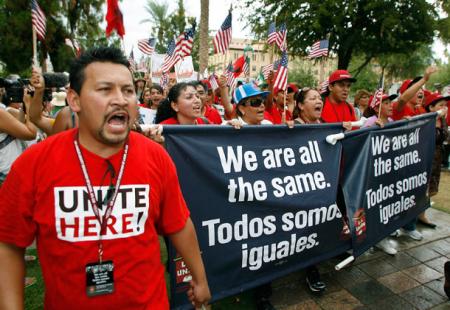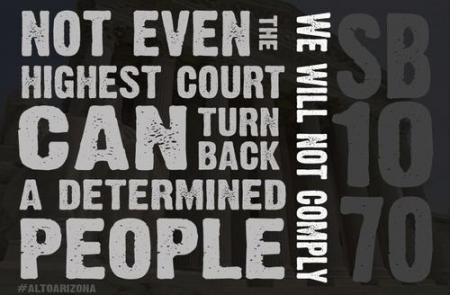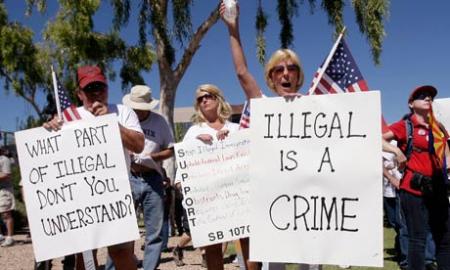Grupos de derechos no estan conformes con el fallo de la Corte Suprema de los EE.UU. sobre la ley de inmigración de Arizona

La Corte Suprema estadounidense declaró este lunes constitucional que la policía del estado de Arizona (suroeste) pueda verificar la documentación de un sospechoso de ser inmigrante ilegal, una medida sin precedentes a la que se oponía el gobierno de Barack Obama.
La Corte decidió sin embargo invalidar otras tres disposiciones de la ley conocida como SB 1070, que provocó un agudo debate sobre los derechos de los estados y del gobierno federal.
Uno de los magistrados señaló que la opinión de la corte fue unánime con relación a permitir que se realice la verificación del estatus migratorio del sospechoso. El máximo tribunal estuvo dividido en torno a derogar las otras disposiciones.


Rights groups dissatisfied with US Supreme Court ruling on Arizona’s immigration law
Asian and Latino civil and immigrant rights groups in California Monday voiced their dissatisfaction over the US Supreme Court ruling on the Arizona anti-immigration law.
A rally and vigil in response to the Supreme Court ruling announcement on the constitutionality of Arizona’s immigration law was held Monday afternoon in front of the US Federal Court building in Los Angeles, organized by civil and immigrants’ rights groups, Asian and Latino community leaders.
The US Supreme Court Monday invalidated critical provisions of the Arizona anti-immigration law, SB1070, holding that those provisions are preempted by federal law.
But the US Supreme Court upheld the controversial provision which has led to racial profiling in other states that have enacted similar provisions, according to the Asian Pacific American Legal Center (APALC) in Los Angeles.
As a result of the Supreme Court’s ruling, local law enforcement officers can no longer criminalize failure to carry immigration registration documents or conduct warrantless arrests, but they can still use the mandate to target individuals based on their appearance and speech if the officers believe that a suspect is in the country illegally, APALC said in a statement.
“We are pleased that the US Supreme Court reaffirmed the long standing view that the federal government has the ultimate authority on immigration,” said Jessica Chia, staff attorney at the Asian American Justice Center (AAJC) and counsel in the Friendly House litigation.
“However, the Court’s decision to uphold racial profiling is deeply troubling and we have grave concerns about how this provision will be implemented, what constitutes ‘reasonable suspicion,’ and how officers will be able to enforce this provision without discriminating individuals based on appearance or speech,” Chia added.
Two members of the Asian American Center for Advancing Justice (Advancing Justice), Asian Pacific American Legal Center (APALC) and AAJC, are co-counsel with a coalition of civil rights groups in a separate lawsuit — that challenged SB1070 because it violates many constitutional rights, including the right to be treated equally regardless of race, the two groups alleged.
One of the Friendly House plaintiffs is Jim Shee, a US citizen of Spanish and Chinese descent. In April 2010, when SB1070 was passed, Shee was stopped twice by local law enforcement and asked to provide his identification documents. As a result, he now carries his passport with him at all times in case he is again pulled over and required to prove his right to be in his own country and state.
“Upholding the narrowest provisions of SB1070 adversely impacts our communities of color. Sanctioning local and state law enforcement to target a person based solely on their ethnicity is inherently unconstitutional and fundamentally contrary to the ideals of our nation,” said Reena Arya, staff attorney at the Asian Law Caucus (ALC).
The Coalition for Humane Immigrant Rights of Los Angeles (CHIRLA), the immigrants’ rights group whose members are mostly Latinos, said the “show-me-your-papers” provision essentially condones racial profiling.
“Thousands upon thousands of people will fall prey to fishing expeditions by anti-immigrant forces,” said Angelica Salas, CHIRLA’s executive director.
In 2011, five US states — Alabama, Georgia, Indiana, South Carolina and Utah — enacted similar state immigration enforcement laws. Federal courts have blocked most of the key provisions of these laws, and those injunctions will not immediately be affected by Monday’s decision.
No other US state has passed a copycat law in 2012, and a growing number of states have realized these laws lead to civil rights abuses for immigrants and citizens, harm businesses, and conflict with fundamental American values of fairness and equality.
